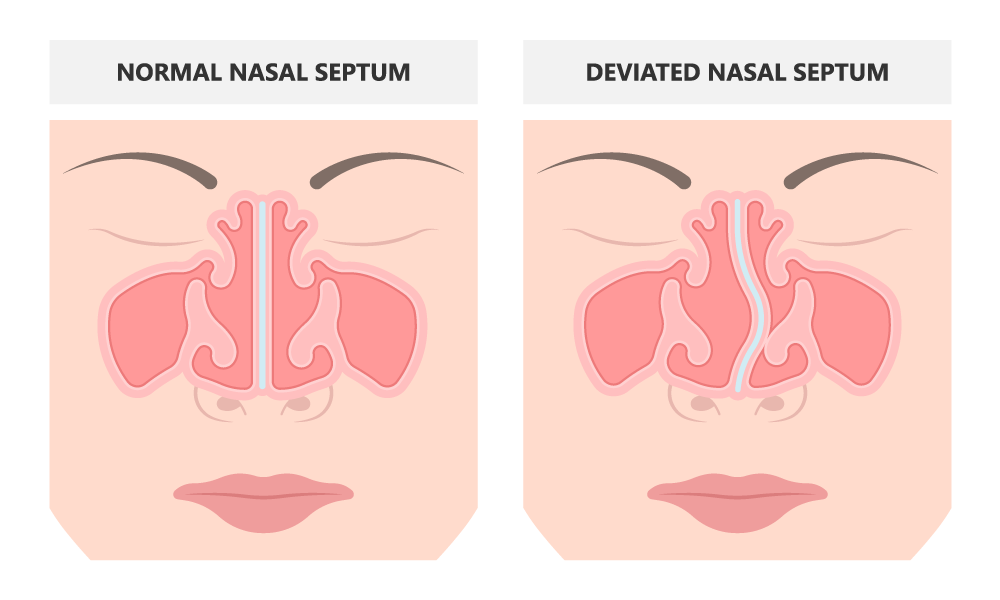We’ve all experienced the frustration of a stuffy nose—that blocked, congested feeling that forces you to breathe through your mouth and often disrupts a good night’s sleep. While a cold or allergies are common causes, for some people, the problem runs deeper. Chronic nasal congestion and difficulty breathing may be caused by a structural issue inside the nose: a deviated septum.
A deviated septum is often associated with trouble breathing through the nose, but the impact can go well beyond congestion. At Minnesota ENT, we know it’s more than just a stuffy nose. Below, we explore some of the less obvious ways a deviated septum can affect your health and quality of life.
Beyond nasal congestion
A misaligned septum can create a ripple effect throughout your head and affect your overall well-being in unexpected ways.

Facial pain and headaches
The sinuses and surrounding nerves are a delicate and interconnected system. When a deviated septum obstructs airflow, it can increase pressure within the sinuses, leading to:
- Sinus headaches
- Facial pain
- Discomfort that’s sometimes mistaken for migraines or tension headaches
Correcting the structural issue may help relieve chronic facial pressure and headaches.
Reduced sense of smell
Your sense of smell depends on airflow to the olfactory nerves, located high in the nasal cavity. A significant deviation can restrict this airflow, leading to hyposmia, or a diminished sense of smell. This can impact:
- Enjoyment of food and flavors
- Your ability to detect potential hazards (like smoke or gas leaks)
- Overall quality of life
Ear pressure and pain
Your ears and nose are more connected than you might think. The Eustachian tube, which helps equalize ear pressure, links the middle ear to the back of the nasal cavity. If nasal airflow is consistently blocked, this tube may not function properly, leading to:
- A sensation of fullness in the ears
- Ear pain
- An increased risk of ear infections
Though not always the main cause, a deviated septum can contribute to ongoing ear discomfort.
Emotional and social impacts
The effects of a deviated septum aren’t just physical. Ongoing congestion and mouth breathing can lead to:
- Persistent dry mouth and throat
- Bad breath (halitosis)
- Snoring, which can disrupt your sleep—and your partner’s sleep
Over time, these issues can chip away at your confidence, contributing to:
- Social anxiety
- Irritability
- Low energy and mood swings
When to see a specialist
Not everyone with a deviated septum needs treatment. In many cases, the deviation is minor and doesn’t cause symptoms. But if you’re experiencing persistent:
- Nasal congestion
- Difficulty breathing through your nose
- Recurrent sinus infections
- Facial pain or pressure
- Changes in your sense of smell
…it’s time to consult with a specialist at Minnesota ENT. A thorough evaluation—including nasal endoscopy, if needed—can determine whether a deviated septum is the root of your symptoms.Relief is possible
The good news? Relief is within reach. For mild cases, treatment may not be necessary. But for more significant deviations, septoplasty—a surgical procedure to straighten the septum—can restore proper airflow and dramatically reduce symptoms.
Relief is possible
The good news? Relief is within reach. For mild cases, treatment may not be necessary. But for more significant deviations, septoplasty—a surgical procedure to straighten the septum—can restore proper airflow and dramatically reduce symptoms.
“The fear of choking or discomfort while eating is a significant concern for those with swallowing difficulties. As ENT specialists, we approach your situation with empathy and offer comprehensive evaluations and treatments to help alleviate these anxieties and improve your safety.”
– Troy Hemme, DO, Minnesota ENT physician
If you suspect a deviated septum may be behind your symptoms, we invite you to schedule a consultation with one of our experienced ENT physicians at Minnesota ENT. We’ll provide a comprehensive evaluation and discuss the best treatment options to help you breathe easier and feel better.
- Call us at 763-233-5755
- Text us at 763-265-6087
- Schedule with our new one-click messaging (click “Message us” in the lower right corner of your screen.)
Appointments are available in Golden Valley, Maple Grove and Robbinsdale.
Don’t let a “stuffy nose” be the only way you think about a deviated septum—its impact may be more significant than you realize.

